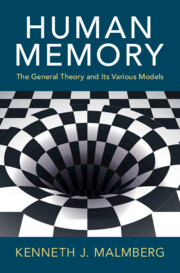Book contents
- Human Memory
- Human Memory
- Copyright page
- Contents
- Figures
- Foreword
- Preface
- Acknowledgments
- Chapter 1 Introduction
- Chapter 2 Models of Cognitive Control, Storage, and Retrieval
- Chapter 3 Search and Detection
- Chapter 4 Sequential Effects
- Chapter 5 Forgetting
- Chapter 6 Differentiation
- Chapter 7 Knowledge
- Chapter 8 Modeling the Consequences of Testing Memory
- Chapter 9 The Buffer Model Revisited
- References
- Index
Chapter 5 - Forgetting
Published online by Cambridge University Press: 17 January 2025
- Human Memory
- Human Memory
- Copyright page
- Contents
- Figures
- Foreword
- Preface
- Acknowledgments
- Chapter 1 Introduction
- Chapter 2 Models of Cognitive Control, Storage, and Retrieval
- Chapter 3 Search and Detection
- Chapter 4 Sequential Effects
- Chapter 5 Forgetting
- Chapter 6 Differentiation
- Chapter 7 Knowledge
- Chapter 8 Modeling the Consequences of Testing Memory
- Chapter 9 The Buffer Model Revisited
- References
- Index
Summary
Forgetting is a phenomenon that is familiar to everyone and among the most extensively investigated in psychological science. It is, therefore, quite surprising that forgetting is widely misunderstood by the layperson and even by researchers. Evidence for the permanence of long-term memories is presented, and the distinction between the accessibility and availability of memories is discussed. Search of associative memory (SAM) and retrieving effectively from memory (REM) models of forgetting are described and extended as a proposal for everyday forgetting.
Information
- Type
- Chapter
- Information
- Human MemoryThe General Theory and Its Various Models, pp. 108 - 143Publisher: Cambridge University PressPrint publication year: 2024
